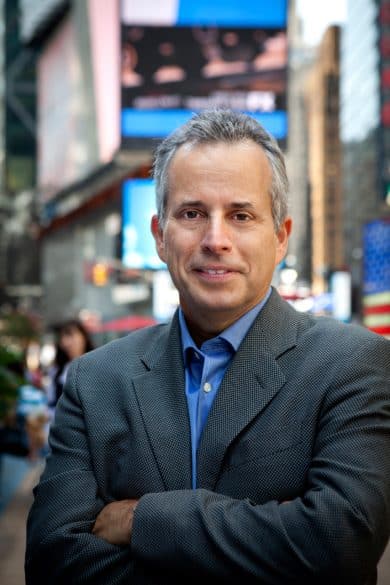
The author of Shift Ahead speaks with Colin Finkle about the pace of market change and how to keep up.
It is easy to think of brands that were once dominant but fell off the map: Sears, Blockbuster, Oldsmobile, etc. It is also easy to play “what if?” What if Sears move their catalog business online? What if Blockbuster took Reid Hastings’ offer to build what would become Netflix with the Blockbuster name? What if Oldsmobile… nevermind, Oldsmobile was probably a lost cause.
What is hard is being within a business and keeping an eye out to see if your brand is less relevant than it once was. Maintaining relevance means being open to the possibility that your business model will not work in the future, and actively looking to see if your assumptions about the customer are wrong. Humans are not good at that; we are great at self-deception and rationalization.
Thankfully, Allen Adamson and Joel H. Steckel have written a guide to actively and continually reassess your business so that your brand can maintain relevance for decades to come.
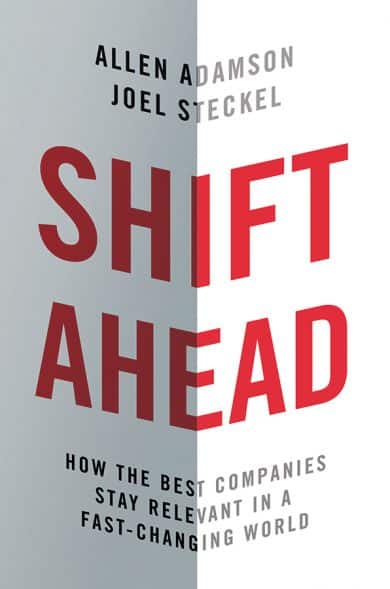
That guide is Shift Ahead: How the Best Companies Stay Relevant in a Fast-Changing World.
Allen Adamson is an expert in branding, and I had the privilege to talk with him.
Allen is the co-founder and managing partner of Metaforce, a brand strategy consultancy that crosses disciplines and prides itself on being able to help companies no matter what their primary sales or communication channels are. He was previously the Chairman of Landor Associates and worked for many years inside Unilever. Allen has worked with brands in many fields: packaged goods, technology, health care, financial services, hospitality, and entertainment.
Allen also teaches brand-related lessons to students and professionals. He has taught classes at New York University’s Stern School of Business, the Samuel Curtis Johnson Graduate School of Management at Cornell University, and the Harvard School of Continuing Education.
Shift Ahead is Allen Adamson’s fourth book. He has previously published BrandSimple, BrandDigital, and The Edge: 50 Tips from Brands That Lead.
He genuinely wants to help leaders identify when they need to shift ahead. Recognizing that the market for your product has changed can be scary; it will mean that you have to leave your comfort zone and make some challenging adjustments. But it is also an opportunity to leapfrog competitors by being first to align your offering with the new market. An organization can transition while maintaining a brand’s image.
I hope you enjoy our talk, and I hope you learn something that will keep your brand relevant for the years to come.
Interview with Allen Adamson
Video
Remember to Subscibe to BMB on Youtube.
Transcript
Colin Finkle
Okay, so as I mentioned before, we have Alan Adamson here with us today. He has a new book called Shift Ahead, which is all about staying current, relevant, and making sure that your business model and brand aren’t falling behind. Allen, how are you doing today?
Allen Adamson
Terrific. Thanks for having me.
Colin Finkle
Great. Okay, so a little softball question that we start everybody off with is: what does the term brand mean to you?
Allen Adamson
Actually, it’s a good place to start. The brand is the idea you want to have come to someone’s head when they hear your product or service name.
But a term that gets misused is branding. And so for me, branding is how you get that brand story inside somebody’s head. It could be advertising, it could be tweeting, it could be the instructions, it could be product design. There are a hundred ways to get a brand in people’s head, and that’s branding. And some people sometimes only focus on your branding is your logo. But I look at branding is everything to get a brand idea situated in someone’s head.
Colin Finkle
Perfect. Okay, so what about your book, Shift Ahead? What is it all about?
Allen Adamson
When I was doing a lot of consulting work, more and more clients are coming in saying: “Gee, we need some marketing. We need some better communication. Our sales are going down” Oftentimes, it was not a question of marketing; they had lost “relevance,” and they had become their father’s Oldsmobile. So, no amount of spin, sell, branding, or imagery could help bring their product back, and I began to say: “Is this just me or are more and more people falling off the Ferris wheel.”
And I set out to do some research. We partnered with a professor from NYU Joel H. Steckel, and we did a lot of research to find out. Is it just us, or are more people falling off the treadmill?
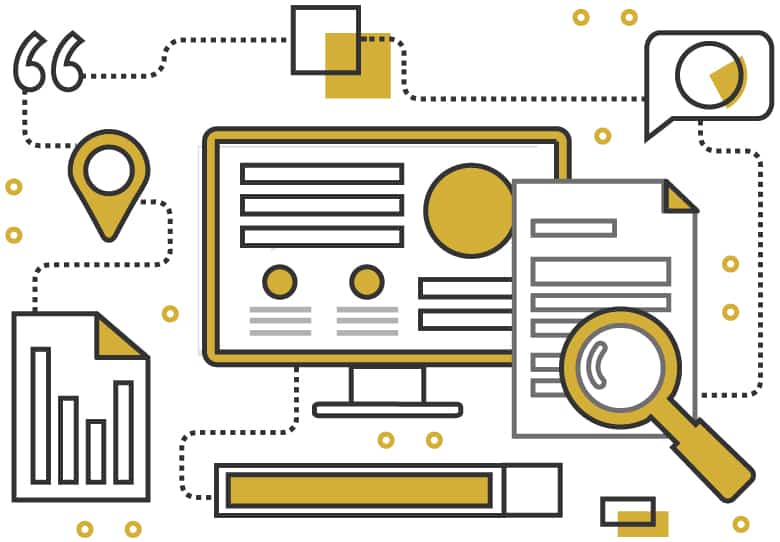
Colin Finkle
Yeah. Tell us about your co-author of this book: Joel H. Steckel. He’s not here with us obviously today. I want to speak to his background a little bit.
Allen Adamson
He’s been a Professor of Marketing at New York University: Stern School for many years and now heads up the Ph.D. program, and he was a great thought partner because we would talk about an issue and dissect it. He was very helpful in trying to craft the observations / the finding’s implications into a lesson learned, a teachable moment. So Sears is going out of business: what else is new? What can you learn from that? Was it a teachable moment? Joel was really helpful and trying to take the research we did and figure out what somebody can learn from it?
Colin Finkle
Yeah, it’s amazing how someone that takes a problem from a different angle can be such a good collaborator. True collaborators. A lot of great authors have a collaborator that, even if they’re not even a co-author, they are someone that’s bouncing ideas off of and coming from different perspectives.
Allen Adamson
Critical thinking , critiquing and pressure testing an idea is the best way to make sure your idea will succeed in the marketplace. If you subject the best ideas to multiple points of view the ideas invariably get sharper and more powerful.
Colin Finkle
Yeah. Critique and opposition have been confused nowadays, where a lot of people think that questing idea is a negative thing. But really, if the intent is to make the idea stronger and get some of the cruft off of them, why not?
Allen Adamson
Anyone could say: you know, this is a terrible idea. All right, thank you. How would you make it better?
Colin Finkle
Yeah. So you were talking before about how a lot of your clients were coming to you and requesting surface-level solutions to a deeper problem. I think a lot of people in our audience, small/medium-sized business owners with not a lot of metrics, get confused when they are doing everything right, but their business is not performing, and their industry is receding and relevance. Like trying to go the wrong way on an escalator: you might put a lot of effort in, but you’re not going anywhere.
Allen Adamson
And that’s a very common thing because people just keep on charging ahead and until sales start to slip. And as everyone knows: sales are a lagging indicator. By the time people have stopped buying your brand, they started to wonder if your brand was relevant along time for that. And they began to look at alternatives before that. So if the only barometer you have is: “if my sales are up, things are good” and “my sales are down, things are bad,” then by the time sales are down, you often don’t have enough time to shift ahead.
Colin Finkle
Yeah, you didn’t know that as soon as possible to make a change in you’re doing. You need to forecast. I think of the bell curve with early adopters on one side and laggards on the other side. The other side of that bell curve, as it’s moving with demographics and change in the marketplace, is pretty big. While the last laggards are still using your product, your sales might be fine, but your company is the future is in trouble.
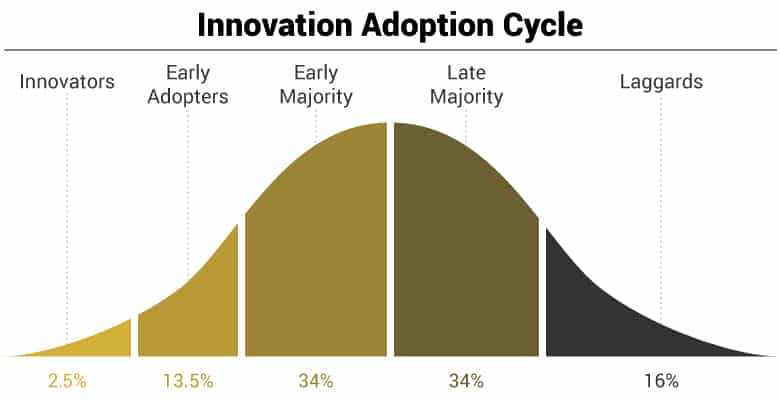
Allen Adamson
Yes. If you ask anyone what’s important in business, most people say: “oh, you have to keep up with the changes, and it’s important to stay relevant.” So what we found was when we researched over 100 companies, some big some small, some profits or nonprofit, some publicly or privately held, that there was no magic: “do these four things, and you’ll be terrific.”
There were many, many things you could do. That would diminish your chance from successfully shifting your business, and one of them was waiting too long to change. If you only start to embark on a change when your sales are dropping, then that’s a really late date to start shifting ahead.
But you see it all the time; as companies are closing stores and cutting back, they’re saying: “we’re going to reinvent ourselves.” If your sales are dropping, two things happen. One is you have less money to spend on something new. And two, people get really nervous. They think: “we can’t do anything, and we’re going to have to protect every dollar, and we can’t spend any trying anything new.”
So your risk aversion goes down; like you’re in Vegas and you’re down to your last chip, you’re not going to go crazy. If you have a pile of chips, you might say I put one on red 22 and one on green 16. The same thing happens in business: when the business starts heading south, it’s often too late to shift.
Colin Finkle
Yeah, yeah, I feel like there’s a human resource part of this too. People whose ambition is to be a part of a high growth company, and it starts to slow and some channels sink, and they say to the CEO: “we’re not in trouble now, but I think we might be in a few months or a few years” They’re not listened to.
Allen Adamson
Two things I’d like to add to that. One, I was talking about money before. And also there’s less money to make bets. But another part of the waiting too long is you not only lose financial ability to make a new investment in a way to reinvent your business but oftentimes for larger companies give me the best talent jump ship before the money runs out.
So lots of companies that get in trouble, they still have a little money left, but a lot of their stars have bailed out because when the company stops growing, there is less opportunity. Ultimately, as important as money is, your business needs the right talent in your team to help you figure out how to shift ahead.
Colin Finkle
Yeah, there is a different mindset of people that want to be part of something exciting versus people that want to cash a paycheck and sit a cubicle. Just those people that are always on to the new thing are the people that you want and the times of crisis, but they’re the first ones out the door. It’s unfortunate, but…
Allen Adamson
I don’t want to be a Debbie Downer here. Don’t underestimate how hard it is, how early you need to start, and how challenging it is. We think as easy as: “Oh, we’ll just put a new and improved sticker on the box and by do a promotion, buy one get one free and everything will be fine.” But it’s also a recipe for tough times.
Colin Finkle
Yeah, but hasn’t every business owner and executive in history thought: “man, the customer’s needs change and the market changes so quickly.” Is it something new, or is it always been a factor in commerce?
Allen Adamson
It’s always been a factor. American Express started off as a delivery service. Obviously, things changed, and they decided that delivering packages wasn’t the right way to go.
But, what we did find is: is it just us, or as a world really experiencing accelerated change. And certainly, in technology, that’s the case. You don’t have to read a book to know that in the tech space, the pace of change is outpacing other space. But most businesses are accelerating the pace of change.
What they’re teaching your business going now is not so much how to be an expert at one thing, but how to be a continuous learner. Because if you learn how to run one business when you graduate business school, the only thing for sure is that it will be irrelevant in five… four…ten years, whatever it is.
So it is accelerating; it’s faster now than it was ten years ago, and it will likely be faster five years from now than it is now. And so you better buckle up because it’s not going to slow down.
Colin Finkle
Yeah. You wonder if there’s any sort of upper limit to the amount of change our economy and the people in our economy can bear. But, we haven’t found it yet; that’s for sure.
I’m glad you brought up tech because angel investors and venture capitalists are assuming that at the end of this long, capital intensive road, there’s going to be a business that’s just printing money for a decade or two decades, maybe forever. Should we rethink venture capital if we’re if the pace of change is getting so much faster?
Allen Adamson
How do you get money for a change?
I’m not sure you have to rethink venture capital. But there is a belief in venture capital that the more disruptive you are, the bigger the business opportunity. But if you look at least two cases, Uber and Airbnb, Uber is clearly more disruptive than Airbnb, but they’re still having trouble making money.
A lot of companies in tech get started on a lifeline of private investment, and they don’t get real about their business soon enough to take off the training wheels when the angel investors are there.
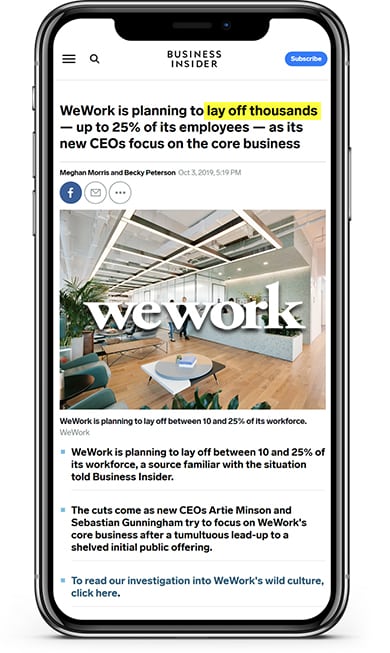
The perfect case is WeWork. That was a phenomenally growing business. But there was so much money coming into it that there wasn’t real discipline. It was really fun. Are we going to make money on this next thing? And now they hit the wall. All of a sudden, the venture funds dried up, and they’re not going out of business, but it’s going to require a different headset to say: “how do we get focused and how do we execute? And ultimately make money on serving beer to people in an office at four o’clock on Thursday afternoon.
Colin Finkle
It seems that you got to keep is that day one mindset on day 565. There’s not there’s no entitlement to success.
There’s one thing I find it’s interesting that you talked about with Uber. There’s a funny contradiction that I thought of as you’re discussing it, where they’re investing tons of tons of now stock market dollars and capital into subsidizing rides assuming this utopic future where they will be the center of this new car ride-sharing market. But meanwhile, they’re making the same assumption that their business model is going to be working in three to five years just the same as the cab companies that they displaced.
If you run on the assumption that something is going to something is working today, so it’s going to work tomorrow, then you’re inviting something to go wrong.
Allen Adamson
Yes. For most people, it’s really hard to see what’s around the corner.
Gillette’s business was not ultimately upended by Schick, even though they spent lots of time worrying about Schick.
Companies play tennis, not golf. I’m bad at both, but if you are going to get better at tennis, then you really focus on your opponent, and you try to hit the ball where they are not. Many companies are in that mindset. In golf, you have to zoom out. Yes, you have to care about the person or people you’re playing with. But, you really have to focus on the wind, the terrain, how far you’re hitting the club, etc.
You need to get your head off what your competitors are doing, and more into watching the consumer. Lots of companies get disrupted because they get fixated on what’s right in front of their nose. Uber totally fixated on Lyft when they both might be in trouble.
Colin Finkle
It speaks to the difference between tactics and strategy, which a lot of people don’t appreciate. A competitor may be worth watching to understand their tactics; maybe they’re doing a tactic that’s paying dividends that you need to catch up on.
I like that analogy because, in golf, you can often make a shot which is not towards the hole but puts you in a better position for the next shot. Taking a step back to better position your company appreciated by a lot of leaders of companies out there.
Allen Adamson
So yeah, we all want to know if disruption is coming around a corner. It’s not like you’re going to buy a crystal ball. And if you always follow the pundits, they always say the same thing.
Part of the success is to get out of your bubble. Talk to people that don’t see the world as you do. [Unfortunately,] companies hire from the same places or hire the same type of people.
People with incredibly regimented, thinking do well and execution because it’s linear and focus, but do terrible it shifting ahead because they’re all marching in one direction and they don’t see the cliff. They just keep on marching right off. So part of your ability to see what’s around the corner is to get out of your bubble. Read stuff, watch stuff that you normally don’t. Go to places you don’t normally go to.
Talk to people outside your immediate circle, and you have a better chance of think of things around the fringe. The best futurists always look for what’s happening in the fringe.
And too many companies are just asking their core customers: “do you like my tuna fish?” “Yes. Great. Thank you.” And, you know, they don’t see change coming in enough time to do anything about it.
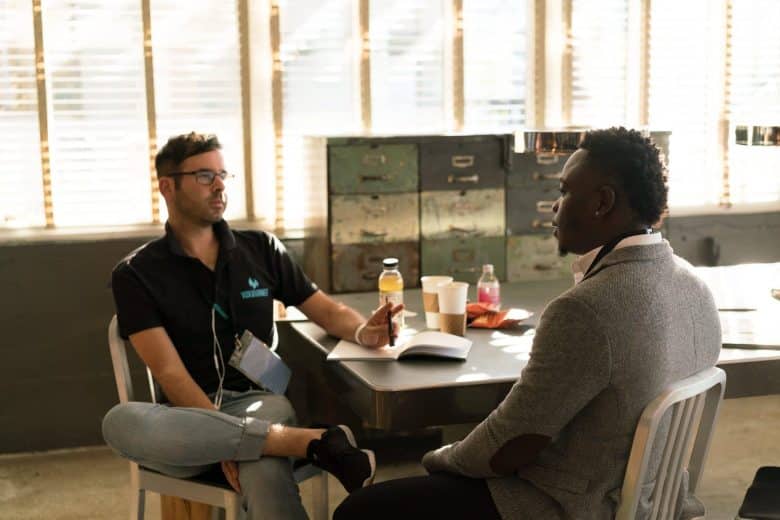
Colin Finkle
Yeah. I was thinking as I was reading for your book, you have lots of great suggestions of places to look to see the signs that your market might be shifting on you, and your product might be receding relevance.
But I was thinking the whole time I was reading: it assumes that someone is ready to see that truth. That’s a painful truth; to entertain the idea that the assumptions that your company is founded on might not be correct anymore is the sort of thought that keeps you up at night.
Allen Adamson
Yes. And the other piece is, you know, there’s a belief that if you ask people, they’ll tell you the right answer. Do you like my product? Of course, I do.
You know, what’s much more effective? [Observing customers.] It’s easier said than done. Observing how people, watching people with your product. [It can be helpful to see] if they’re not picking your product up and using it, or it’s spending more time on the shelf. The people that are stronger at observing behavior and seeing things get a better chance to shift ahead than people who wait for someone to tell them: “I don’t think your orange juice tastes that good anymore.”
Colin Finkle
Yeah. Yeah. So one of the best advice I ever received for doing market testing or even just having friends critique your idea is to give them social permission to tell you about the flaws.
It’s not helpful to ask them: “what do you like about this?” They’re going to tell you that anyway, especially if you’re face to face.
But for them: “what is one thing that could make this idea of fall on its face or fail? I want to be aware.” And they think: “Oh, okay. Since you gave me permission, now I’m going to give you the real deal. Whereas, as you said, people, most people want to tell you what you want to hear. It’s a human nature thing.
Allen Adamson
Way back early in my career, I was doing some research with Pizza Hut, and we’re asking: “do you like the cheese? Do you like the pizza?” The answer was: “maybe a little more cheese or little more pepperoni.” But all of a sudden somebody asks a question: “What if Pizza Hut went out of business? What would you do?” And that would elicit the most interesting feedback. “I would just go buy Papa John’s.” No one cared. Because everyone looked at the other end.
So it was clear that they will tell you all the things you could do, but ultimately they didn’t feel your pizza was that different or that special. So if the price went up a bit or you went out of business, it wouldn’t change my life. And that’s not where you want to have your business.
Colin Finkle
Yeah. I like the Domino’s case study that you brought into your book. When they came up, the idea of quick delivery was interesting and innovative and was appropriate by the customers at that moment. But fast delivery became table stakes; that feature was expected by the market. “Yeah, we want quick delivery, duh…”
Allen Adamson
And that it tastes like cardboard was a bigger issue, but no one was talking about that.
Colin Finkle
Yeah, but then the market shifted. The grocery store started filling up with better-for-you products, and there was a new focus on ingredients and artisanal stuff. Domino’s was caught out.
Allen Adamson
Yes, exactly. It’s always easy on Monday morning to say what you should have done Sunday during the game. Another challenge of shifting any business is: it’s always obvious in hindsight.
The trick is to try to do something preemptively. [Now is] the best time to do innovation.
That was another thing that we talked about in the book. Lots of companies sit down and say: “Oh, well, on Thursday at two o’clock, we’re going to have our planning meeting for next week.” And so there is a belief that we’re going to worry about tomorrow on Thursday at two o’clock. And of course, Thursday at two o’clock comes, something else happens, and the meeting gets postponed.
The best companies are worried about tomorrow every day.
Colin Finkle
Yeah, I learned that lesson in a funny way. I was watching one of these silly business turnaround shows on TV, and this resort manager was changing a light bulb outside of one of his rental properties. The consultant came up and said: “you don’t need to be worried about the light bulbs for the customers today. You can hire people to do that. As a manager, you need to worry if the lights are on for the customers tomorrow.” And I’m like: “oh my God, that’s so true. That’s so interesting.”
It’s so easy to get comfortable in day-to-day operations. Thinking about the future requires assumptions, retesting, disagreement, and argument. People in leadership should really be focused on tomorrow’s customers and hire people to have to serve the customers today.
Allen Adamson
Yes. Exactly.
Colin Finkle
Okay, I’m just I’m conscious of your time now. You’ve been generous with your time so far because I know you’re a busy guy. So one last question: What is your best advice for fellow brand builders out there?

Allen Adamson
Keep it simple. Focus and do less really well, because most of the games are won by people who execute better than other people.
And if you’re doing three things, then chances are you do three things well. But if you do two things, you’ll probably do two things better. And if you really say you’re going to be excellent at one thing, then there’s a better chance you’ll breakthrough.
So it’s always been the case: less is more. Just focus on a few things and doing them extraordinarily well.
Colin Finkle
I love that. I love that answer. I completely agree.
Well, thanks for taking the time and speaking with me, speaking with our audience.
If we’ve convinced our audience to swallow the red pill and they want to think about if their business is receding in relevance, where should they get your book? Where’s the best place to buy it?
Allen Adamson
Unfortunately, Amazon. But if you can find a bookstore that has it, please buy it there. But it’s available on Amazon or Barnes and Noble online. Thanks for inviting me on.
Colin Finkle
We’d love to have you back and do some more chatting. There’s definitely a lot of content in the book, and I know that your background is so rich that we’d love to chat with you some other time.
Allen Adamson
All right! Have a good day.
Disclosure. This article includes Amazon Associate links. If you click one of these links and purchase something, Colin Finkle receives a small commission at no cost to you. Colin Finkle also received a free copy of Shift Ahead in preparation for this interview.

Leave a Reply